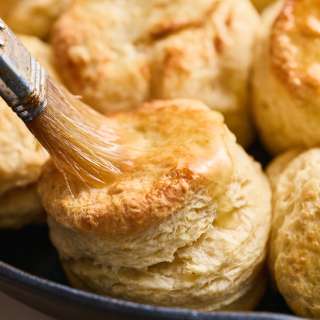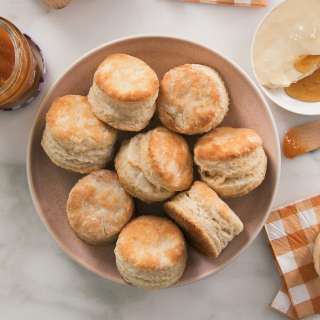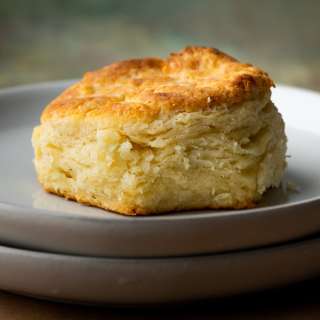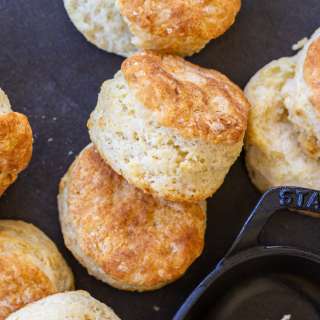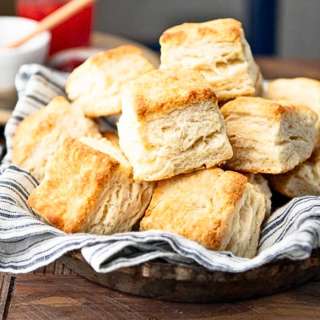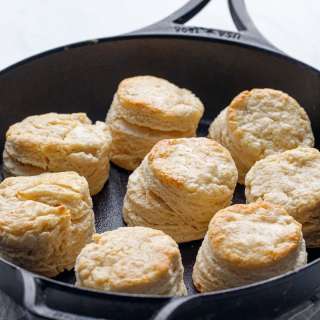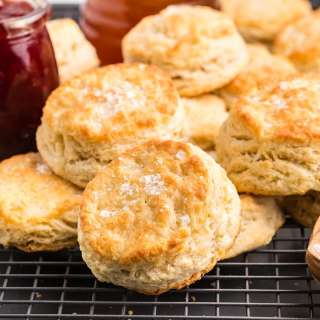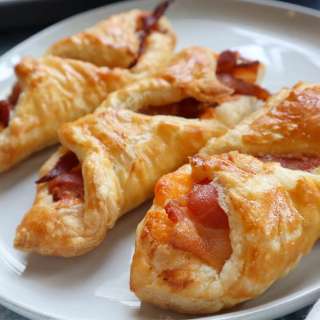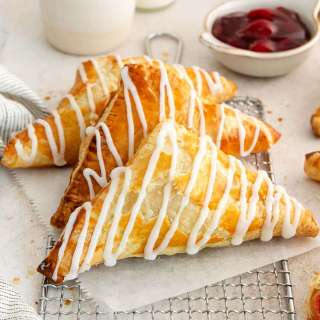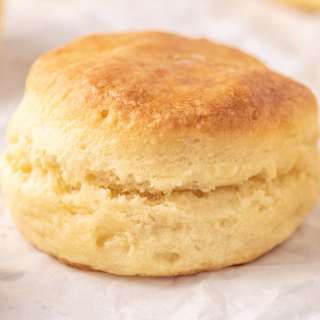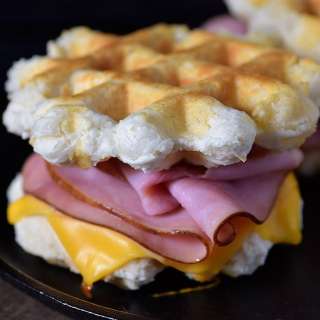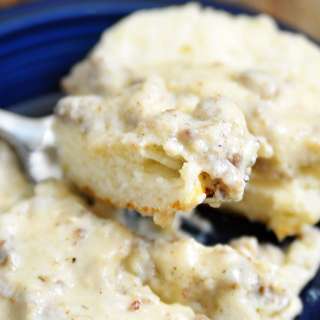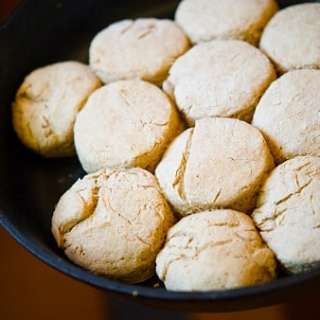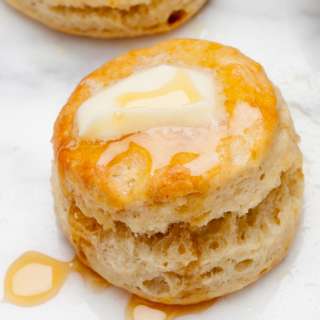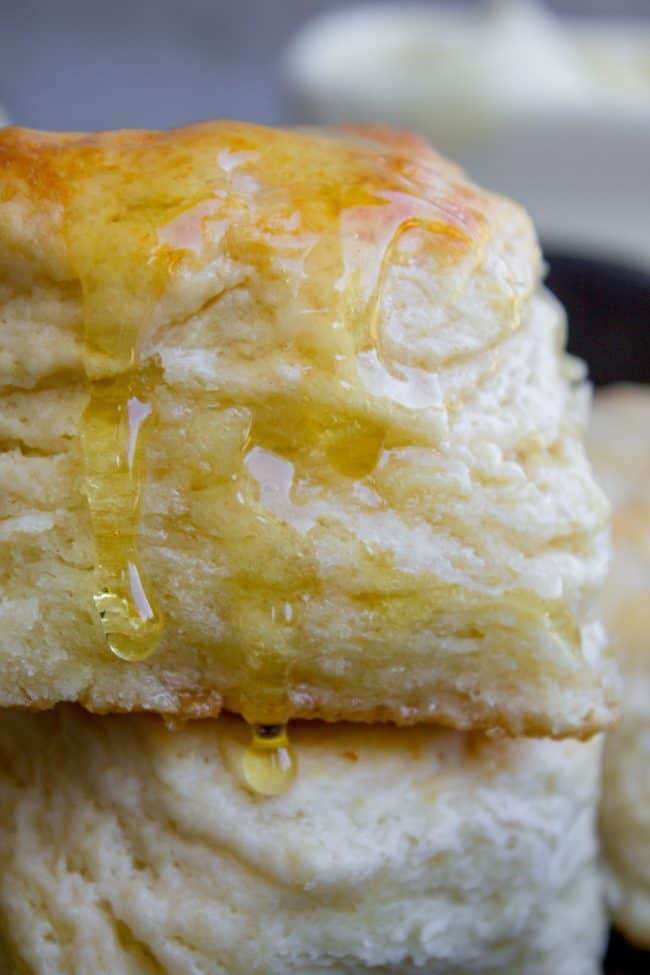
How to Make Flaky Buttermilk Biscuits
User Reviews
4.9
96 reviews
Excellent

How to Make Flaky Buttermilk Biscuits
Report
Who can resist a crispy-on-the-outside, tender-in-the-middle, mile-high flaky buttermilk biscuit? It's the perfect comfort food! Here's how to make them. It's not hard, just a few simple tricks!
Share:
Ingredients
- 3 cups flour spooned and leveled
- 1 & 1/2 teaspoons kosher salt
- 2 teaspoons sugar
- 2 tablespoons + 1 teaspoon baking powder
- 3/4 cup butter COLD or frozen (1 and 1/2 sticks)
- 1 large egg
- 3/4 cup cold buttermilk*
- 1 to 2 tablespoons ice water
- 1 tablespoon butter softened (for greasing pan)
- more buttermilk for brushing
- honey and butter for serving, or this Cinnamon Honey Butter ∞
Instructions
- Preheat the oven to 425 degrees F.
- In a large bowl combine flour, kosher salt, sugar, and baking powder.
- Use a pastry cutter to cut the butter into the flour. You can also use a fork, a butter knife, or your hands to work the butter into the dough. It should be crumbly with pea-size chunks. Stick the bowl in the fridge if you have any delays.
- Use a pastry cutter to cut the butter into the flour. You can also use a fork, a butter knife, or your hands to work the butter into the dough. It should be crumbly with pea-size chunks. Stick the bowl in the fridge if you have any delays.
- In a small bowl combine the egg and buttermilk. Beat with a fork. Add ice and water to a small bowl, and set a tablespoon nearby so it's ready to go.
- Add the buttermilk mixture to the flour mixture. Use a fork to hydrate the flour. Do NOT over work the dough.
- Add ice water 1 tablespoon at a time. You don't need much, this is just to help the flour absorb into the wet ingredients.
- Make as few strokes as possible to get your result: a very thick, slightly sticky dough. Switch to using flour-dusted hands for the last few kneads.
- Turn the dough out onto a lightly floured work surface (a pastry cloth works great, if you have one.) Use your hands to pat the dough into a rectangle, then use a rolling pin to roll the dough into a roughly 12×8 inch rectangle. It doesn’t have to be perfect.
- Fold the short sides of the dough into the middle, like a business letter. See photos.
- Turn the dough over (flouring your surface again if necessary) so that the seam of your business letter is down.
- Use your hands or the rolling pin to flatten the dough. This is the last step before cutting. Don't roll it too thin! You want THICK biscuits. Think like at least an inch if not more. Flatten the dough enough to where you will be able to cut at least 6-8 biscuits on the first go.
- Use a 3-inch biscuit cutter (<these are the ones I wish I had!) to cut the dough. Do NOT twist the cutter. Firmly push it straight down, then pull up. Use your fingers to gently loosen the dough from the cutter.
- Continue with the rest of the dough until there are only scraps. Gather the scraps in your hands, gently press them together, then roll out again, remembering to keep the dough thick. Continue until the dough is gone.
- Prepare a 12-inch cast iron skillet** with 1 tablespoon softened butter (or melted.) Make sure to grease the sides.
- Place the biscuits in the pan. They should be touching each other, as this helps them rise in the oven.
- At this point, if you have time and space, I highly recommend freezing or at least refrigerating the pan of biscuit dough for 15-20 minutes. The butter in the dough has warmed up from your hands, and you want it hitting the oven as cold as possible to achieve Ultimate Flakiness Levels.***
- Just before you put it in the oven, brush the top of each biscuit with buttermilk. This helps it to get that pretty brown topping.
- Bake at 425 for 15-20 minutes, or until the tops are golden. If the tops are brown but you suspect they are not done, lift the edge of one biscuit to check the bottom. They are done when the bottoms are brown.
- If desired, brush the biscuits with melted butter. Or you could just eat them immediately, serving with soft butter, honey, jam, and/or this Cinnamon Honey Butter (<< I’m telling you guys, this stuff is legendary.)
Notes
- *You can make cheater buttermilk! Add 2 teaspoons vinegar or lemon juice to a liquid measuring cup, then fill to the 3/4 line with dairy, the thicker the better. Whole milk, half and half, or straight up heavy cream will do fine. Real buttermilk is best of course.
- **You don't have to buy a cast iron skillet to make these biscuits! It just makes for a super crispy biscuit bottom, so I recommend it. You can bake these on a regular baking sheet. Make sure you grease the pan with the tablespoon of butter. I've also used a silicone baking mat with success (without butter. It was less crispy.)
- ***While researching biscuits, I read that some restaurants make their biscuit dough a day in advance and freeze them, shaped. They put them in the oven frozen solid. I haven't tried it yet, but I bake cookie dough from frozen all the time so I'm pretty confident. You may have to bake longer. This would be a great make ahead option!
Nutrition Information
Show Details
Serving
1biscuit
Calories
324kcal
(16%)
Carbohydrates
35g
(12%)
Protein
6g
(12%)
Fat
18g
(28%)
Saturated Fat
11g
(55%)
Polyunsaturated Fat
1g
Monounsaturated Fat
5g
Trans Fat
1g
Cholesterol
67mg
(22%)
Potassium
85mg
(2%)
Fiber
1g
(4%)
Sugar
2g
(4%)
Vitamin A
575IU
(12%)
Calcium
220mg
(22%)
Iron
2mg
(11%)
Nutrition Facts
Serving: 9biscuits
Amount Per Serving
Calories 324 kcal
% Daily Value*
| Serving | 1biscuit | |
| Calories | 324kcal | 16% |
| Carbohydrates | 35g | 12% |
| Protein | 6g | 12% |
| Fat | 18g | 28% |
| Saturated Fat | 11g | 55% |
| Polyunsaturated Fat | 1g | 6% |
| Monounsaturated Fat | 5g | 25% |
| Trans Fat | 1g | 50% |
| Cholesterol | 67mg | 22% |
| Potassium | 85mg | 2% |
| Fiber | 1g | 4% |
| Sugar | 2g | 4% |
| Vitamin A | 575IU | 12% |
| Calcium | 220mg | 22% |
| Iron | 2mg | 11% |
* Percent Daily Values are based on a 2,000 calorie diet.
Genuine Reviews
User Reviews
Overall Rating
4.9
96 reviews
Excellent
Other Recipes
